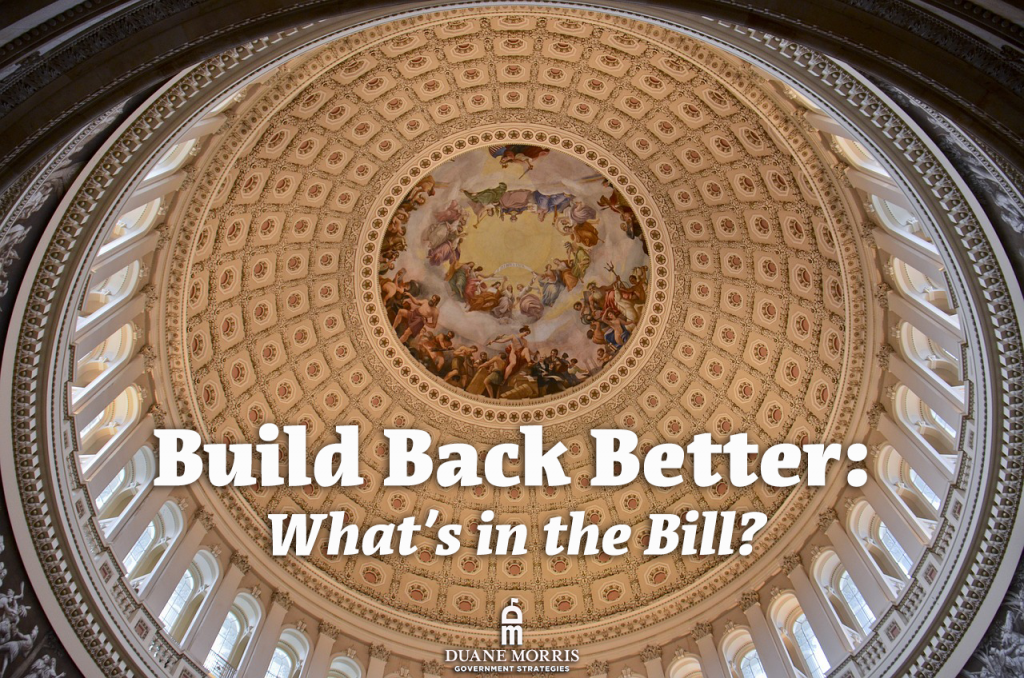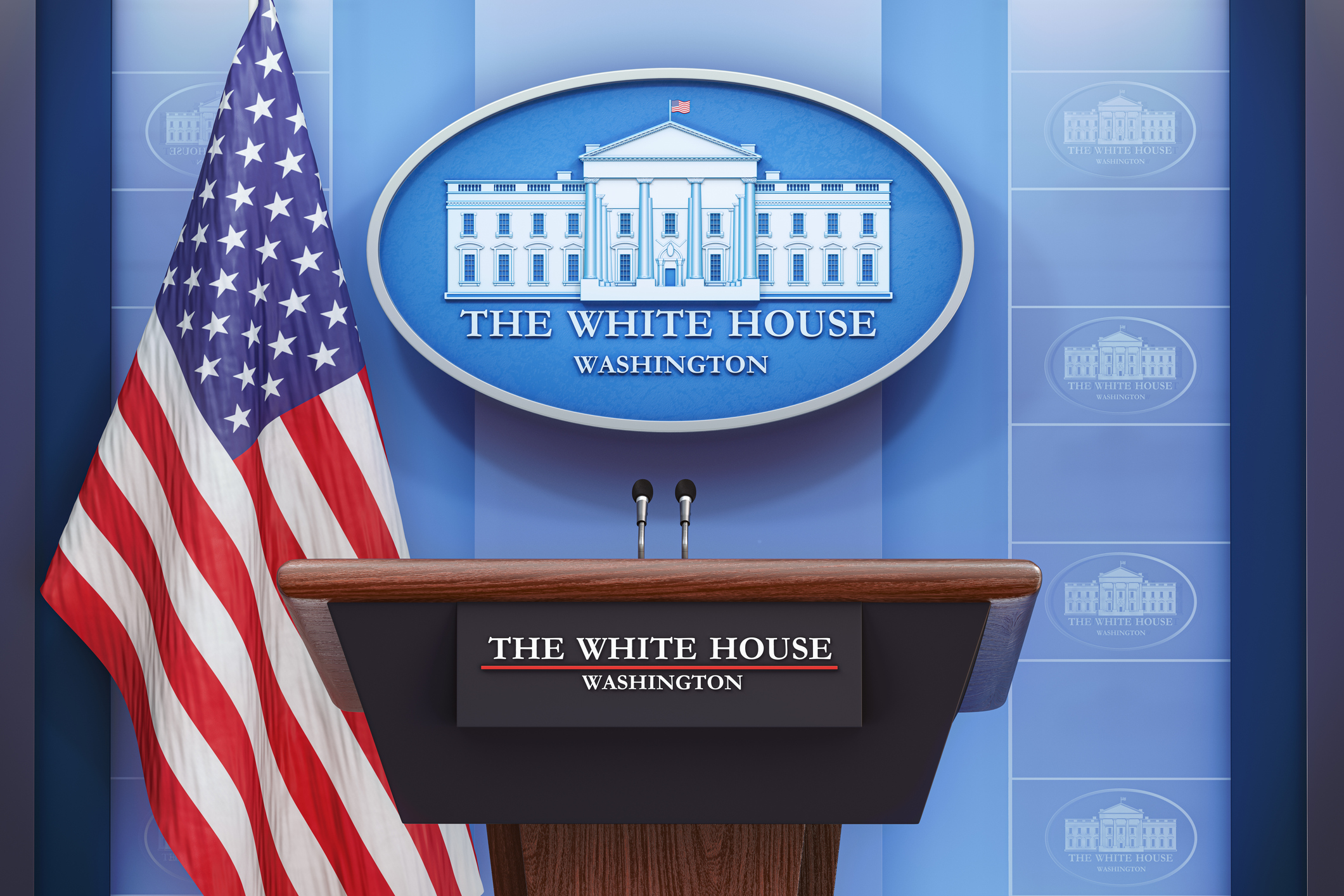On November 19, 2021, the House passed a $2 trillion reconciliation bill—the Build Back Better Act—to implement key elements of President Joe Biden’s economic agenda. The bill has faced an uphill battle in the Senate, where it needs 50 votes to pass. Intense negotiations between the White House and Democratic Senators have ground to halt at the end of 2021. Senator Joe Manchin (D-WV) has recently expressed opposition to the bill as currently drafted.
Nevertheless, the Senate plans to vote on the measure “very early” in 2022. The White House and Senate are working to determine whether they can salvage some of the human infrastructure bill to address Manchin’s demands while maintaining the support of the rest of the Democratic caucus.
Provisions of Build Back Better
The bill (H.R. 5376), which the House passed 220-213, includes clean energy incentives, four weeks of paid family leave, childcare aid, universal preschool, and Medicare drug price negotiations. Several earlier proposals were left out of the House bill or modified as Democrats sought to reduce the initial $3.5 trillion price tag and find consensus within their caucus. Congress dropped a wide range of initially proposed policies, including higher tax rates for corporations and high-income individuals, Medicare dental and vision coverage, free community college, and a utility carbon reduction incentive program. Congress also pared back proposals to negotiate prices for a broader group of drugs, provide 12 weeks of paid family leave, and permanently enhance premium tax credits under the Affordable Care Act (ACA).
Expenditures in Build Back Better
Workforce
The Build Back Better Act would authorize $390 billion to provide universal pre-K and establish an affordable childcare program for six years. It would also spend $195 billion to create a national paid family and medical leave program, which most countries globally provide.
Infrastructure
The bill would also authorize $555 billion for climate change mitigation, including $200 billion on clean energy and climate resilience investments, $190 billion on clean energy & electric tax credits, and $60 billion on clean fuel & vehicle tax credits.
Tax Cuts
The BBB would spend $200 billion to expand the Child Tax Credit (CTC) and the Earned Income Tax Credit (EITC). The CTC and EITC would be extended for one year. However, the CTC would be permanently fully refundable for 2023 and afterward.
Healthcare
The BBB would also spend $335 billion to expand health care benefits, including $150 billion for home- and community-based services, $125 billion for expanded ACA tax credits and closing coverage gaps, $30 billion to provide hearing benefits under Medicare, and $30 billion in health care workforce development
Housing & Education
The BBB would additionally provide $170 billion to build and support affordable housing. It would also dedicate $40 billion for higher education and other workforce development programs.
SALT
One of the most tightly negotiated provisions, the BBB would increase the State And Local Tax (SALT) deduction cap from $10,000 to $80,000 for tax years 2021 through 2025 but would establish an $80,000 SALT deduction cap from 2026 through 2030 and enact a $10,000 cap in 2031.
Offsets in Build Back Better
The BBB offsets its expenditures with tax increases on high-income earners and corporations, increased IRS funding, and prescription drug pricing reforms, among other measures.
The bill would set a 15% minimum tax on large corporations, a 1% surtax on stock buybacks, a global 15% minimum tax on foreign corporate earnings, and other corporate tax changes.
It would increase taxes on the wealthiest Americans with a 5% surtax on income above $10 million and an 8% surtax on income above $25 million. The BBB would also close pass-through income and Medicare tax loopholes.
It would also extend the limitations on high-income earners’ ability to claim business losses past 2026.
Latest News
Photo credit: iStock.com/Prostock-Studio Across the country, states are proposing new policies that would restrict the use of Supplemental Nutrition Assistance Program (SNAP) benefits for the purchase of sugary foods, such as soda and candy. These [...]
Photo credit: iStock.com/24K-Production Across the United States, lawmakers are increasingly reconsidering psilocybin policy in response to growing evidence of its therapeutic potential. Psilocybin is a naturally occurring psychedelic compound found in particular species of mushrooms. [...]
Photo credit: iStock.com/Bet_Noire On January 20, 2025, Donald Trump was inaugurated as the 47th President of the United States, marking the beginning of a second term in office. Trump immediately set the tone for the [...]
Photo credit: iStock.com/Naypong The rise of Name, Image, and Likeness (NIL) rights has revolutionized collegiate athletics, empowering student-athletes to monetize their personal brands while maintaining eligibility, something we previously covered in 2023. Since California's groundbreaking [...]







Stay In Touch